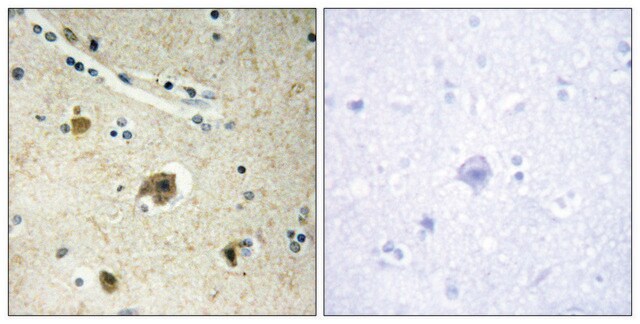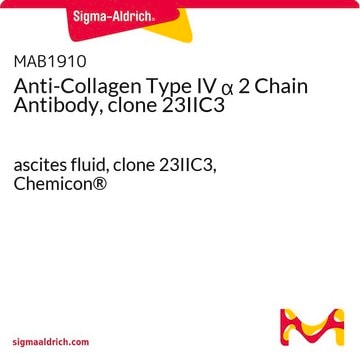추천 제품
생물학적 소스
mouse
Quality Level
결합
unconjugated
항체 형태
ascites fluid
항체 생산 유형
primary antibodies
클론
COL-94, monoclonal
포함
15 mM sodium azide
종 반응성
human
기술
dot blot: suitable
immunohistochemistry (formalin-fixed, paraffin-embedded sections): 1:500 using protease-digested sections of human tissue
immunohistochemistry (frozen sections): suitable
indirect ELISA: suitable
microarray: suitable
동형
IgG1
UniProt 수납 번호
배송 상태
dry ice
저장 온도
−20°C
타겟 번역 후 변형
unmodified
유전자 정보
human ... COL4A1(1282) , COL4A3(1285) , COL4A4(1286) , COL4A5(1287) , COL4A6(1288)
일반 설명
Monoclonal Anti-Collagen Type IV (mouse IgG1 isotype) is derived from the COL-94 hybridoma produced by the fusion of mouse myeloma cells and splenocytes from BALB/c mice immunized with human collagen Type IV.
The composition of the extracellular matrix of all vertebrates is dominated by a class of molecules known as collagens, each with a unique feature suited to its function and location. Type IV collagen is a major constituent of basement membranes. This molecule is a continuous triple helix, about 400 nm in length, composed of at least two different α chain subunits termed α1 (IV) and α2 (IV) which may be composed of the same or different molecules. Upon proteolysis, fragments of 125 kDa, 95 kDa, and 60 kDa are released from a parent α1 (IV) chain, whereas fragments of 115 kDa, 80 kDa, and 45 kDa apparently originate from a distinct α2 (IV) chain.
특이성
Using immunohistochemical staining of basal laminae, the antibody recognizes an epitope located on the α1 and/or α2 chains of human collagen type IV. The antibody shows reactivity with native primate collagen type IV in ELISA and dot blot assay. Using the dot blot technique, the antibody shows no cross-reactivity with human collagen types I, II, III, V, VI and VII, human vitronectin, fibronectin and chondroitin sulfate types A, B and C.
면역원
human collagen type IV
애플리케이션
Monoclonal Anti-Collagen, Type IV antibody produced in mouse has been used in
- indirect immunolabeling
- immunofluorescence staining
- western blotting
- immunohistochemistry
- immunocytochemistry
생화학적/생리학적 작용
Collagens are known to have multiple functions. They are involved in tissue differentiation, morphogenesis and repair; play a role in the maintenance of tissue architecture; and form the filtration barrier of blood vessels.
면책조항
Unless otherwise stated in our catalog or other company documentation accompanying the product(s), our products are intended for research use only and are not to be used for any other purpose, which includes but is not limited to, unauthorized commercial uses, in vitro diagnostic uses, ex vivo or in vivo therapeutic uses or any type of consumption or application to humans or animals.
Not finding the right product?
Try our 제품 선택기 도구.
Storage Class Code
12 - Non Combustible Liquids
WGK
nwg
Flash Point (°F)
Not applicable
Flash Point (°C)
Not applicable
시험 성적서(COA)
제품의 로트/배치 번호를 입력하여 시험 성적서(COA)을 검색하십시오. 로트 및 배치 번호는 제품 라벨에 있는 ‘로트’ 또는 ‘배치’라는 용어 뒤에서 찾을 수 있습니다.
이미 열람한 고객
Eeva-Mari Jouhilahti et al.
The American journal of pathology, 178(2), 500-505 (2011-02-02)
Cutaneous neurofibromas are the hallmarks of neurofibromatosis type 1 (NF1). They are composed of multiple cell types, and traditionally they are believed to arise from small nerve tributaries of the skin. A key finding in the context of this view
The aromatase inhibitor anastrozole is associated with favorable embryo development and implantation markers in mice ovarian stimulation cycles
Karaer O, et al.
Fertility and Sterility, 83(6), 1797-1806 (2005)
Structure and Function of Basement Membranes
LeBleu VS et al
Exp. Biol. Med, 232, 1121-1129 (2007)
Katelyn V Batterman et al.
Frontiers in immunology, 12, 607691-607691 (2021-03-06)
Normal aging is characterized by declines in processing speed, learning, memory, and executive function even in the absence of neurodegenerative diseases such as Alzheimer's Disease (AD). In normal aging monkeys and humans, neuronal loss does not account for cognitive impairment.
Mikala Egeblad et al.
Current opinion in cell biology, 22(5), 697-706 (2010-09-09)
The extracellular matrix (ECM) is a key regulator of cell and tissue function. Traditionally, the ECM has been thought of primarily as a physical scaffold that binds cells and tissues together. However, the ECM also elicits biochemical and biophysical signaling.
자사의 과학자팀은 생명 과학, 재료 과학, 화학 합성, 크로마토그래피, 분석 및 기타 많은 영역을 포함한 모든 과학 분야에 경험이 있습니다..
고객지원팀으로 연락바랍니다.












